Explaining the power imbalance between an individual worker and management is a no brainer.
If a business is able to freely draw from a pool of suitable applicants, the unemployed, an applicant or worker has no real bargaining power. The employer sets the pay rate, 'we offer x dollars per hour' on a take it or leave it basis.
What is the applicant or worker going to do, demand more?....ha, ha, sorry, goodbye. Is the manager going to grant extra pay out of the goodness of his heart? Rarely if ever happens.
Think about it. Try to imagine yourself in that position. it's called empathy and a basic understanding of how power structures work.
It's basic stuff. I explained it before. It shouldn't need repeating.
Your argument only applies if there is too much unemployment.
Note, also, that there are various skilled fields where the practitioners have the choice of being an employee or doing it on their own. If there really was the imbalance you talk about this would cause a big shift towards doing your own business. Note that there are also hybrid cases where workers can work with an employer for a percentage of their receipts rather than a salary. Again, if there was the imbalance you think there is you would see a lot of shift towards that sort of arrangement.
Reality check: My wife used to work under such an agreement. A coworker got jealous and wanted the same sort of agreement, thinking he would be making a lot more money. Oops--he discovered the reality was that his income didn't shoot up and that he often would get paid months later as he got paid when the office got paid. You do make somewhat more that way because you are assuming some of the risk the employer normally assumes. (When you're an employee you are paid for doing your work, if the company doesn't get paid it doesn't come out of your check. Something goes wrong and you're just sitting on your ass, the employee gets paid.)

